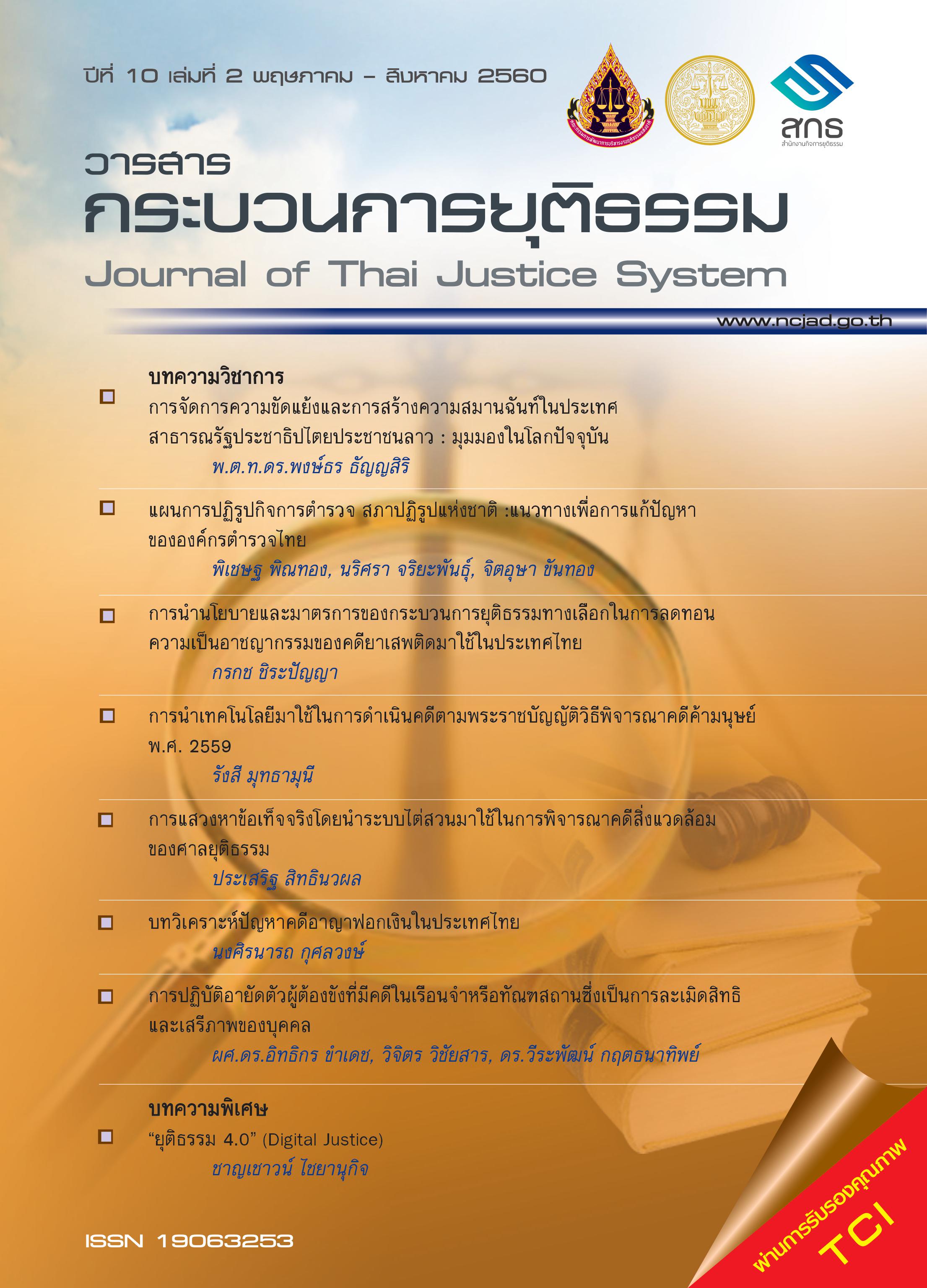การแสวงหาข้อเท็จจริงโดยนำระบบไต่สวนมาใช้ในการพิจารณาคดีสิ่งแวดล้อมของศาลยุติธรรม
Main Article Content
บทคัดย่อ
ปัจจุบัน ประเทศไทยมีศาลพิจารณาคดีสิ่งแวดล้อมโดยตรง คือศาลปกครองแผนกคดีสิ่งแวดล้อม ซึ่งพิจารณาคดีโดยใช้วิธีการแสวงหาข้อเท็จจริง ตามระบบไต่สวน และศาลยุติธรรมแผนกคดีสิ่งแวดล้อม ใช้วิธีการแสวงหาข้อเท็จจริง ตามระบบกล่าวหา อันสามารถตัดสินและดำเนินการตามกระบวนการทางกฎหมายได้โดยตรง ทั้งนี้ คดีสิ่งแวดล้อมเป็นเรื่องประโยชน์สาธารณะ และอาจส่งผลกระทบต่อระบบนิเวศของโลกด้วย บางเรื่องอาจไม่สามารถพิจารณาได้จากพยานบุคคลหรือพยานเอกสารเท่านั้น แต่เป็นเรื่องที่ต้องประจักษ์ด้วยสายตาตนเองหรือต้องอาศัยผู้เชี่ยวชาญเฉพาะด้านในการพิสูจน์ทางวิทยาศาสตร์ เช่น ปัญหาสภาพน้ำเน่าเสีย ปัญหาเรื่องกลิ่นรบกวน เป็นต้น เพื่อมิให้เกิดความสงสัยในความบริสุทธิ์และความผิดของผู้ถูกกล่าวหา การพิจารณาคดีในชั้นศาลยุติธรรมนั้น เราจึงควรใช้วิธีการแสวงหาข้อเท็จจริง ด้วยการนำระบบไต่สวนมาใช้แทนระบบกล่าวหาที่ใช้อยู่ในปัจจุบันเป็นพิเศษแตกต่างจากบทกฎหมายทั่วไป ทั้งนี้ เพื่อประโยชน์สาธารณะและในขณะเดียวกันก็ยังคงให้ความเป็นธรรมแก่ปัจเจกชนตามเจตนารมณ์ของกฎหมายสิ่งแวดล้อม
Article Details
ต้นฉบับที่ได้รับการตีพิมพ์ในวารสาร เป็นลิขสิทธิ์ของวารสารกระบวนการยุติธรรม แต่ความคิดเห็นที่ปรากฏในเนื้อหาของบทความในวารสารกระบวนการยุติธรรม ถือเป็นความรับผิดชอบของผู้เขียนแต่เพียงผู้เดียว
เอกสารอ้างอิง
ประพันธ์ ทรัพย์แสง. (2548). การค้นหาความจริงของศาลฎีกาแผนกคดีอาญาของผู้ดำรงตำแหน่งทางการเมือง : แนวทางปัญหาสู่ความเป็นระบบไต่สวนเต็มรูปแบบ. หลักสูตรผู้บริหารกระบวนการยุติธรรมระดับสูง (บ.ย.ส.) วิทยาลัยการยุติธรรม สำนักงานศาลยุติธรรม. สืบค้นเมื่อ 9 กุมภาพันธ์ 2559, จาก http://www.library.coj.go.th/indexresert.php?page=14
ศาลปกครอง. (ม.ป.ป.). กระบวนพิจารณาแบบไต่สวน. สืบค้นเมื่อ 29 ธันวาคม 2558, จาก http://www.admincourt.go.th/00_web/02_kadee/02_ procedure/
02_proc02.htm
สถาบันวิจัยรพีพัฒนศักดิ์, สถาบันสิทธิมนุษย์และสันติศึกษา(มหิดล), มูลนิธิชุมชนไทย และคณะนิติศาสตร์ ธรรมศาตร์. (ม.ป.ป.). ความยุติธรรมตามตัวอักษรกับความเป็นธรรมตามความเป็นจริง. สืบค้นเมื่อ 9 กุมภาพันธ์ 2559, จากhttp://www.recoftc.org/ node/46644
สันต์ชัย เหล่าสันติสุข. (ม.ป.ป.). ความรับผิดเพื่อละเมิดของผู้ก่อมลพิษทางสิ่งแวดล้อม. สืบค้นเมื่อ 9 มกราคม 2559, จาก http://libdoc.dpu.ac.th/mtext/article/
422981.pdf
สำนักงานนโยบายและแผนพลังงาน กระทรวงพลังงาน. (ม.ป.ป.). โครงการศึกษาเพื่อจัดทำนโยบายและแผนงาน 15 ปี ด้านการลดการปลดปล่อยก๊าซเรือนกระจกจากภาคพลังงานของประเทศไทย. สืบค้นเมื่อ 9 กุมภาพันธ์ 2559, จากhttp://www.eppo.go.th/ ccep/kyoto.html
ภัทรศักดิ์ วรรณแสง. (19 สิงหาคม 2552). บทบาทของศาลยุติธรรมกับกฎหมายสิ่งแวดล้อม (The Role of the Court of Justice and the Environmental Law). สืบค้นเมื่อ 9 มกราคม 2559, จาก https://www.dlo.co.th/node/252
หยุด แสงอุทัย. (4 สิงหาคม 2549). “บทความเกี่ยวกับระบบกล่าวหา ระบบไต่สวน.”
บทบัณฑิต. (ฉบับที่ 12), 339.
สมชาย หอมลออ. (27 กุมภาพันธ์ 2554). บทความ: “ปัญหาการพิจารณาค่าทดแทนและค่าใช้ จ่ายแก่จำเลยในคดีอาญา”มูลนิธิผสานวัฒนธรรม. สืบค้นเมื่อ 9 มกราคม 2559, จาก https://voicefromthais. wordpress.com/2011/05/17/บทความ-ปัญหาการพิจารณา/
สุนทรียา เหมือนพะวงศ์. (14 ธันวาคม 2006), “ความยุติธรรมด้านสิ่งแวดล้อม ข้อเสนอว่าด้วยการมีศาลใหม่ "ศาลสิ่งแวดล้อม", สถาบันวิจัยรพีพัฒนศักดิ์ สำนักงานศาลยุติธรรม, สืบค้นเมื่อ 9 มิถุนายน 2559, จาก http://prachatai.com /journal /2006 /12/10914
สำนักงานนโยบายและแผนพลังงาน กระทรวงพลังงาน. (ม.ป.ป.). โครงการศึกษาเพื่อจัดทำนโยบายและแผน งาน 15 ปี ด้านการลดการปลดปล่อยก๊าซเรือนกระจกจากภาคพลังงานของประเทศไทย. สืบค้นเมื่อ 9 กุมภาพันธ์ 2559, จาก http://www.eppo.go.th/ ccep/kyoto.html
ศรีสุวรรณ จรรยา. (29 กรกฎาคม 2556). น้ำมันรั่วอ่าวไทย. สืบค้นเมื่อ 9 กุมภาพันธ์ 2559, จาก http://www.prachatai.com/journal/2013/07/47896
อรรถพล ใหญ่สว่าง. (เมษายน – มิถุนายน 2557). “หลักนิติธรรม.” วารสารอัยการ. 27(271), 43.


